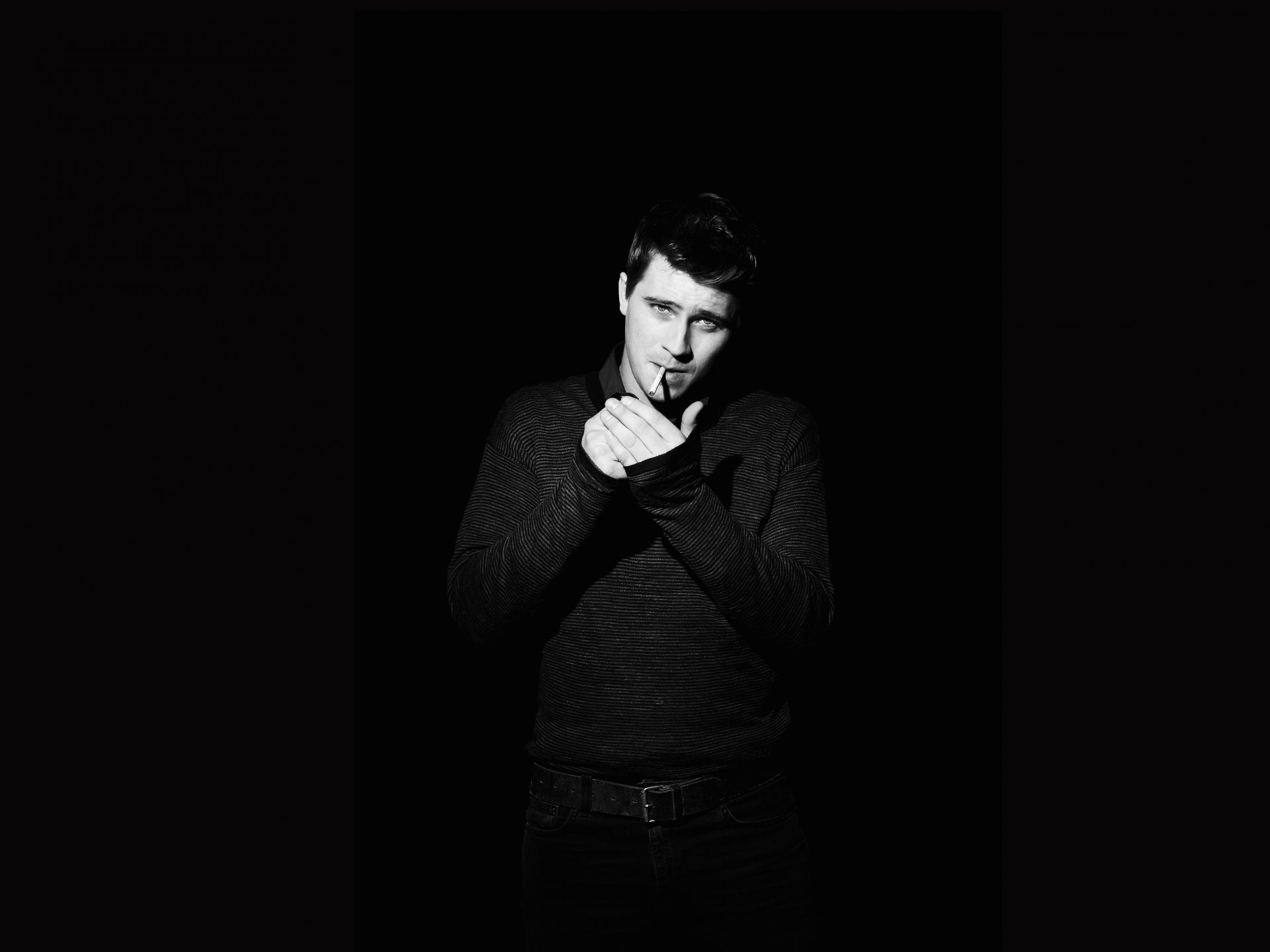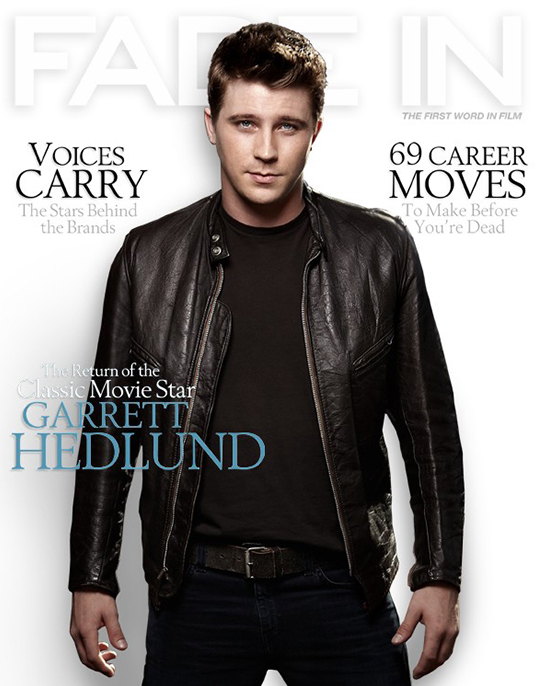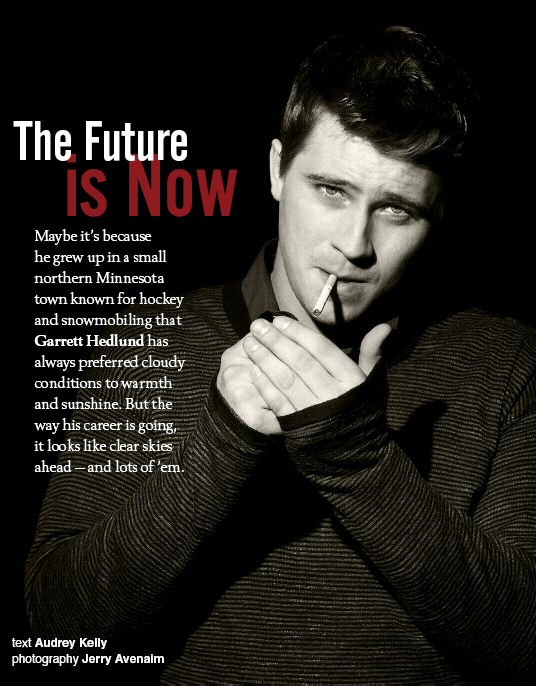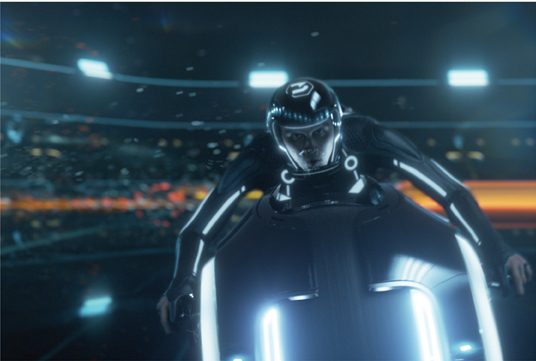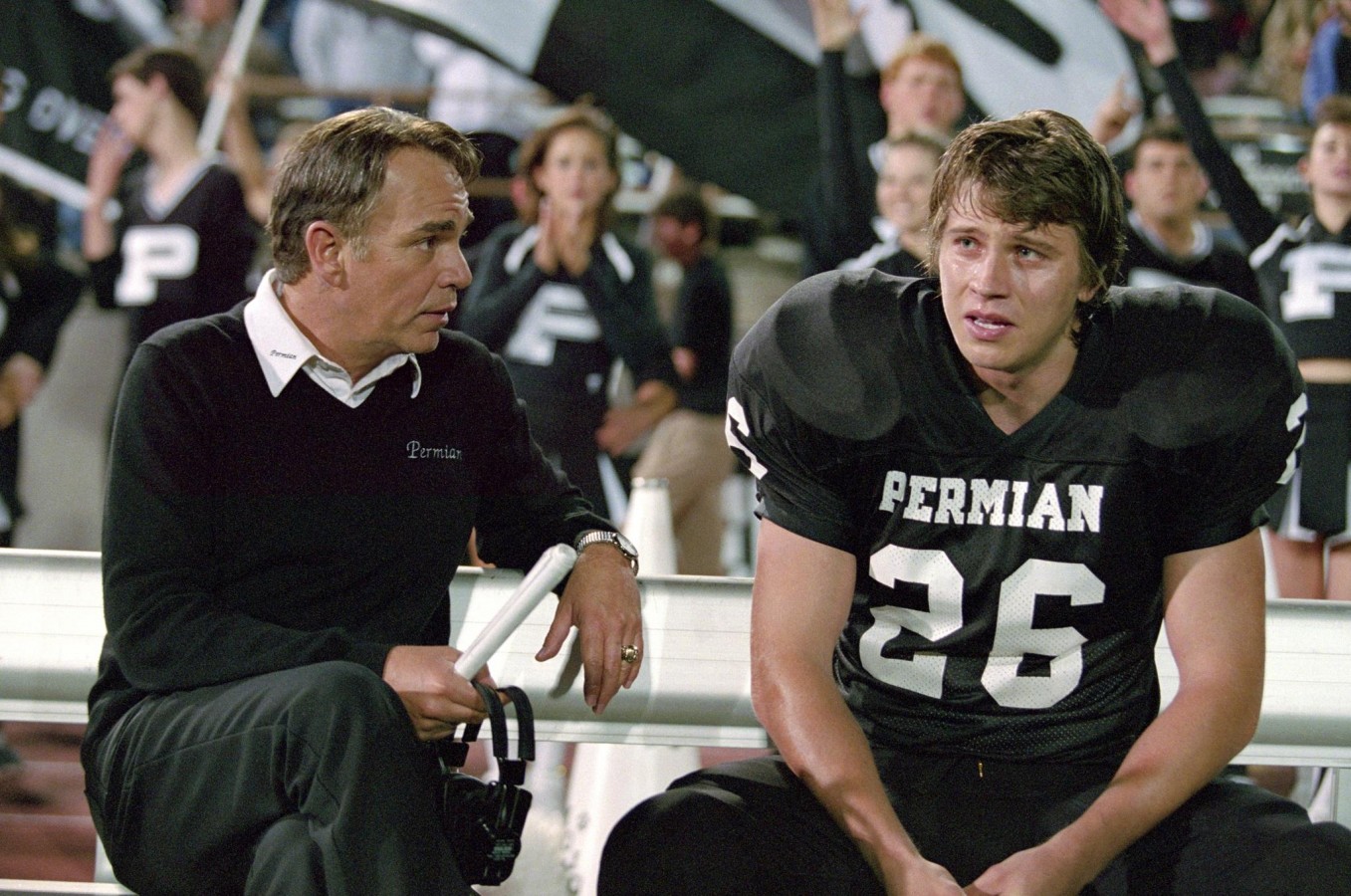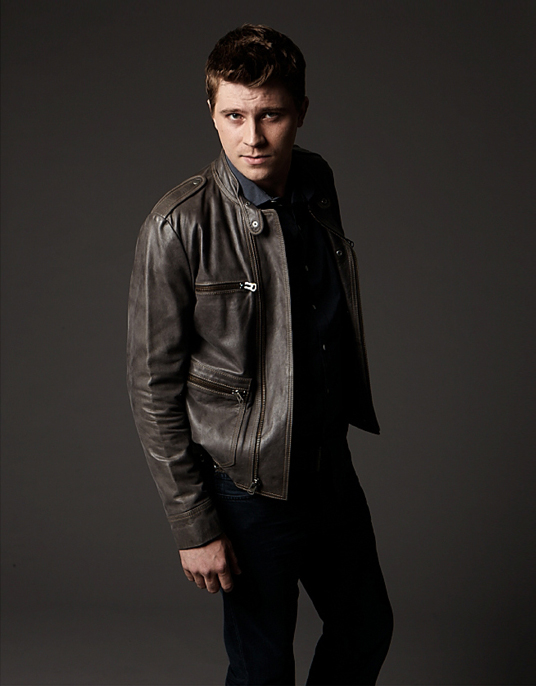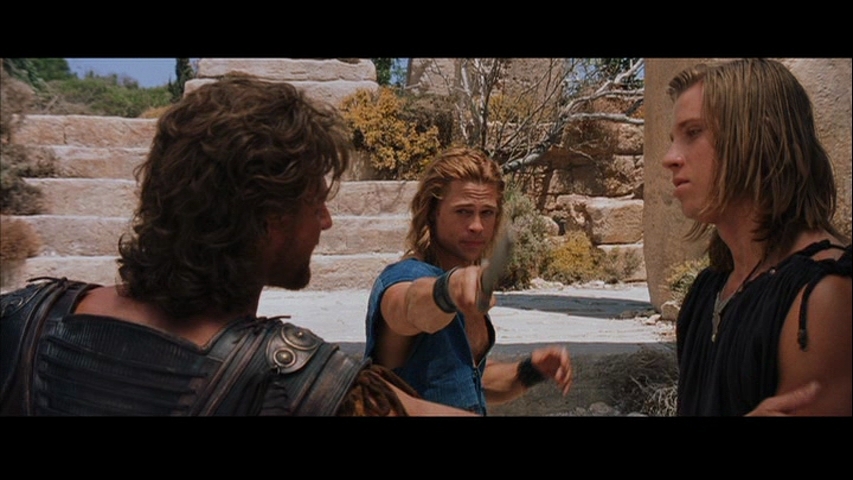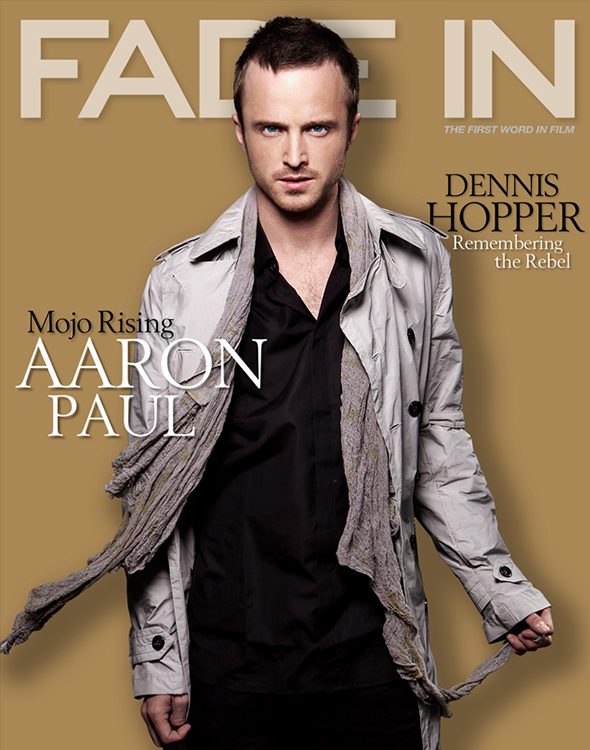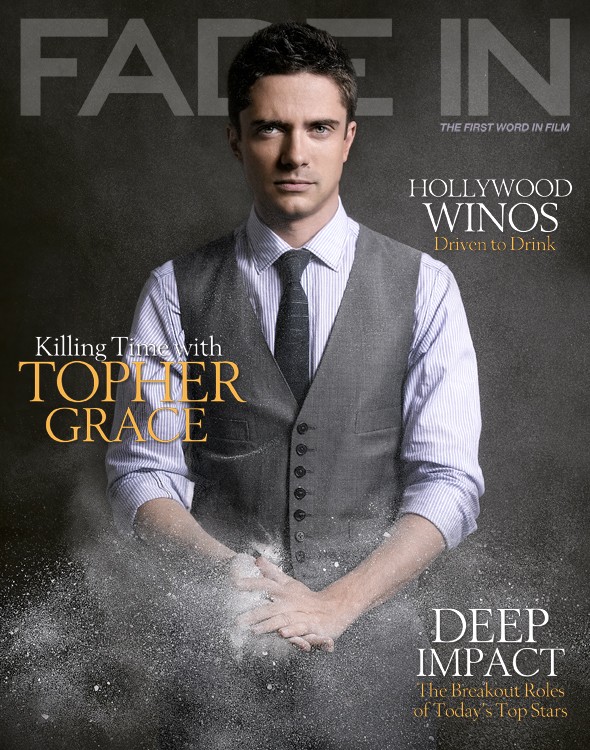From the time he started high school in Arizona — where he moved from Minnesota with his mother following his parents’ divorce — Hedlund picked up modeling gigs while taking acting classes and studying the show-biz trade papers to learn about how the industry works. He managed to get an agent and over the next two years flew to L.A. dozens of times for auditions. The more experience he acquired and knowledge he absorbed, the more impatient Hedlund became, until he finally got so antsy that he graduated a semester early to accelerate the pursuit of his dream.
“I came out with about $600, a Tupperware container of cleaning utensils that my mom’s friends got me at Christmas and about ninety packages of ramen noodles,” he says.
It didn’t take long for his diet to improve, because within a month of his arrival in L.A., director Wolfgang Petersen cast him in the period epic Troy. In the film, based on Homer’s Iliad, Hedlund played Patroclus, the comrade of Achilles, played by another transplanted Midwesterner, Brad Pitt.
Soon afterward, he was cast opposite another star, Billy Bob Thornton, as a high-school football player in Friday Night Lights, which he followed with a role in the action drama Four Brothers, as one of Mark Wahlberg’s titular siblings.
At that point, Hedlund could have easily gone off the rails with too-much-too-soon excess. Instead, he kept working, landing parts in the adventure fantasy Eragon, the dysfunctional-family comedy Georgia Rule and the gritty thriller Death Sentence.
In all, that’s a solid resume with a number of interesting choices and an impressive list of costars. Yet even though Hedlund has built an avid fan base among younger (albeit female) audiences, he has remained below the radar to the public at large. But with two high-profile projects on the way, 2010 could be the year he goes from working actor to full-fledged star.
He’ll join recent Oscar winner Jeff Bridges in TRON Legacy, the long-gestating sequel to the 1982 sci-fi saga that starred Bridges as Kevin Flynn, a programmer who finds himself trapped inside a computer and must fight his way out. In Legacy, filmed in 3-D, Hedlund stars as Flynn’s son, Sam, who infiltrates a computer in search of his dad.
Bridges, who still remembers his days as an up-and-comer, took a shine to his young co-star. “I dug working with Garrett,” he says. “I admired the way he embraced the physical, emotional and mythological aspects of his role. He’s also a cool guy to hang with.”
Later this year, Hedlund will share the screen with another Oscar winner, Gwyneth Paltrow, in Country Strong, a romantic drama set in the world of country music.
True to his goal of always seeking out roles that are different from those he has played in the past, Hedlund is also attached to director Walter Salles’ adaptation of Jack Kerouac’s classic novel On the Road. The character he’ll be playing would be a gift to any young actor: Dean Moriarty, based on Kerouac’s brilliant but self-destructive friend, Neal Cassady, one of the major figures of the Beat movement of the 1950s.
Hedlund is clearly enthusiastic about the project.
“For the last three years now, [Salles and I have] been in constant communication with each other and ready to work on this project together,” he says. “It’s getting damn near time.”
And it’s damn near time more moviegoers got to know Garrett Hedlund.
You moved to L.A. after graduating from high school in Arizona, and within a month, you landed a supporting role in Troy. Is that just how your life goes, and do people hate you for it, or were you completely blindsided by good fortune? Prior to moving out to L.A., I had been flying back and forth from Arizona for auditions for two years, and I had flown back and forth for about twenty-five auditions. The responses were all similarly crappy.
Why do you think that was? Sometimes you don’t know what you’re supposed to do within the technicalities of things, like an audition process or even the filming process. I’d been auditioning for two years, and I’d had representation. When I finally drove out to L.A. after graduating, I parted ways with all my representation, and Troy was literally the first script I had gotten.
For all the auditions I went on, everybody in every one of the rooms looked like me, in one sense or another, and [I asked myself], “How are you going to separate yourself from all of this? I guess you have to be smarter than everyone.” So for two years I basically sat down and never really left my room. I’d turn on a pot of coffee as soon as my mom would go to bed, and read a book cover to cover, and then go straight to school and come back and rest, or go to work and stay up all night and write a whole short story for creative writing that wasn’t assigned — just something to keep me going. The creative route of things just really came on strong. I don’t know what it was, but maybe it was reading something like [Aldous Huxley’s novel] Brave New World, or reading [about] the concept of genetic engineering or something that really branched my mind off to a different place of wonderment. I started questioning the possibilities of, “If this is real…” And then I started questioning the possibilities of everything. So then my mind was going in all different directions, but all in good ways. I just wanted to learn. When I was sixteen, seventeen, I used to throw out the word “self-development” a lot because I was always trying to grow my mind. I wasn’t so concerned about what my body was.
And you attribute this to your current success and ability to break in? Understanding yourself, and knowing what you have to offer. While a lot of my friends were in theatre and spending all their time reading Shakespeare, I was reading Stanislavski, Uta Hagen and Milton Katselas and splitting that time with going to Barnes & Noble and reading Variety and Hollywood Reporter, seeing who was who in the industry, knowing who the heads of the companies were, knowing who the best agents and managers were and who they represented, and who I would aspire to be with. So when I was in Arizona, I called Endeavor to try to get Edward Norton’s agent on the phone to try to talk to him about Motherless Brooklyn, a Jonathan Lethem novel, and now I’m with Endeavor. Then I tried to get Bernie Brillstein on the phone because I thought he was probably the most respectable manager around.
They took my number down and said they would call me back. Three years later, when I was signed with Brillstein, I went to one of his book signings and he signed my book, “Now that you’re a client, I may return your call.”
“I hope, after [Tron], I can maintain the amount of privacy I’ve been able to maintain. So when it comes to a certain role, maybe a character dealing with this or that, you can completely dive in and believe the character rather than what everybody’s photographing on the streets.”
“If you show any nerves it’s only going to take away from your audition. [On Troy], I figured if everybody was already cast, and they were all A-listers, if I want to get into a film with A-list actors, then I’d better walk into the room pretending to be one.”
What did you say when you called? They’d say, “Who is this?” And I’d say, “My name is Garrett Hedlund. I’m an aspiring actor from Arizona seeking representation and I was wondering if you’d sit down with me.” [Laughs] You know… when I got here that script [for Troy] got into my hands, and I [already] had headshots, and they said, “Well, be patient, and we’ll see if we can even get you an audition for this.” Since I had the script, and I’d read it twice, I immediately started studying it. Then I got the audition and went in with the casting director’s assistant, and then the casting director, Laura Kennedy, then with her and the producer and [director] Wolfgang [Petersen], and then with Wolfgang, the producer and Brad [Pitt], finally, on Valentine’s Day.
That’s still remarkable. Did you envision getting the role? When there’s a situation like that, where it’s really a big deal but can be kind of nerve-wracking, I always found it easier to not be nervous about everything, and be confident about that, because if you show any nerves it’s only going to take away from your audition. I figured if everybody was already cast, and they were all A-listers, if I want to get into a film with A-list actors, then I’d better walk into the room pretending to be one.
That’s hard to do — to show no fear. So it wasn’t really a month in town and, boom, you got the role of a lifetime, so fellow actors shouldn’t hate you. No. No. I got to be the struggling actor who had to pay $400 to go to an audition when these other guys got to roll out of bed and drive to it for $5 in gas money. So that’s what was always on my mind. I almost ran away to move out here a year before I actually did, just because I didn’t think I’d be able to spend another year in Arizona going to high school and lettin’ everything that goes on out here go on out here. I was really eager.
When I got Troy it was a great validation, and then I was out filming in Malta as my class was graduating [from] high school.
Is there someone’s career that you admire or aspire to emulate? It’s never been one person’s career; it’s been more like a moment out of a lot of actors’ careers. I really admire John Malkovich. I really admire Peter Sellers. I really admire Jack Nicholson and Sean Penn for doing all the films they’ve done, and Johnny Depp for doing all the films he’s done. I admire a melting pot of about twenty different actors for about twenty different reasons. Maybe I could just try and be one of those for each film.
One thing that is notable about your work is you’re very chameleon-like. You never look the same in any film. There are actors, who shall go nameless, where you go, “Oh, there’s so-and-so.” Being so-and-so with a different name.
When you see them, they bring you out of the experience. That’s why I hope, after all this, I can maintain the amount of privacy I’ve been able to maintain. So when it comes to a certain role, maybe a character dealing with this or that, you can completely dive in and believe the character rather than what everybody’s photographing on the streets.
You’re referring to your eighth film, the big-budget studio franchise TRON Legacy, out in December? I’ll let the excitement of the film speak for itself. I’m probably just as excited as everybody else is to see the film. With TRON, it was a long shoot, but wonderful to go through working with Jeff Bridges and Olivia Wilde and to work with Joseph Kosinski on his first breakthrough into the feature world. He’s such a brilliant director. A lot of people were surprised when they hired a, technically, first-time director to work on this film, but all you have to do is look at http://www.josephkosinski.com and you go, “Of course, this is the only director capable of doing this film.” I believe everyone is able to see that now.
Jeff Bridges said he brought on a consultant to add a spiritual element. The Buddhist element. His character, more specifically, is more within that Buddhist realm. So that helped that. Stephen Lisberger’s [writer-director of the original 1982 version of TRON] approach to this has always been a mix of humanity and technology. So bringing in someone like that on Jeff’s part only helped add to the pot of diversity this actually does deal with. Instead of it just being a sci-fi film or something that’s 3-D, and cool to watch for a couple of hours, it deals with a much grander spectrum. Even in terms of the disc, it’s a circular shape, which is the circle of life.
3-D films: rip-off or renaissance? Renaissance. I know a lot of people who feel this is now going to be [part of] every film. I met a director who just told me in a meeting recently that all he wants to do from now on is 3-D films. I guess it’s more fun to watch, sort of. I don’t feel the same. I want everything to go back to film. I want everything to have the flaws and not every gate to be clean.
Country Strong has a lot of the same echoes that Crazy Heart has. The music has a lot to do with both films. Music can add in a great way to these films, and both of these films have wonderful soundtracks, but in different directions. Ours is a little more diverse because you have me singing, you have Gwyneth Paltrow singing and Leighton Meester singing.
Did you talk to your TRON costar Jeff Bridges about it while making it? I didn’t. I haven’t seen Crazy Heart yet. I didn’t want to watch it for the sole purpose of not having that in my mind. The only similarity is you’re following someone on a downward spiral, or after that’s already happened, and that’s probably the only way it’s similar. This film is so strange. I don’t even know how to explain Country Strong, really. You just have to watch the film. Because I can say I play guitar, and I sing in it, but I don’t believe myself saying it right now because I feel so different, you know?
